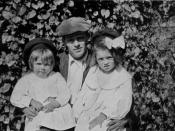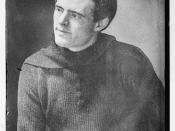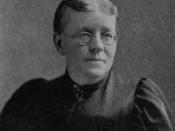A Beautiful Novel
"No literary historian but sooner or later must reckon with Jack London." Fred Lewis was exact in his The Development of the American Short Story in describing London's various works (Labor, 87). In Earle Labor's Jack London, he described Call of the Wild as an instant classic. The literary community shows enormous admiration towards London's ability to combine realism, romanticism, and symbolism all in one novel. Jack London's Call of the Wild is one of the greatest and most advanced books of American history (Buck, 254).
Jack London lived a harsh life from the start. Shortly after his birth in 1876, he was abandoned by his father, and he took his stepfather's name. When he was a young 14, London was forced out of school and into the work force due to his family's poor financial condition. He did try to expand his horizons by reading works by Karl Marx, Friedrich Nietzsche, and other philosophical scholars.
Even though he came back from the gold rush of 1898 penniless, the lifelong memories of the harsh Klondike served as the setting for a great number of his books. Interviews with London near his death show great depression, and many researchers believe that this lead to suicide.
London's characters were the most advanced of his time. Buck was smart, fearless, and instinctual, and he knew when to use each of these traits (Buck, 255). At one of the peaks in action and anticipation in the book, Buck runs into his rival. "In a flash Buck knew it. The time had come. It was to the death" (London, 78). Buck did not fear the lead dog, Spitz, even though he realized that only one of them would come out alive. Spitz was an experienced fighter, and throughout the fight it looked...


